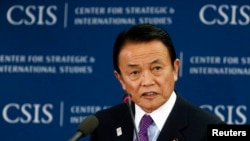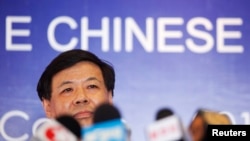BEIJING —
Asia’s two biggest economies, Japan and China, are voicing concerns about the ongoing government shutdown in Washington and the possibility that Congress may fail to raise the debt ceiling, leading to a government default.
Financial leaders there are telling U.S. officials, both openly and in private, about the ripple effect the dispute in Washington could have on their investments in bonds and what that could mean for their own economies.
According to U.S. Treasury figures, Japan owns $1.135 trillion in U.S. Treasury bonds and China slightly more at $1.277 trillion.
Speaking at a regular news briefing on Tuesday, Japanese Finance Minister Taro Aso urged political leaders in Washington to resolve the debate before the October 17 deadline, when the United States risks defaulting on its debts.
On Monday, China's deputy finance minister, Zhu Guangyao, urged U.S. leaders to learn from the past, noting the last time the dispute neared the brink in 2011, the credit rating agency Standard and Poor's downgraded the U.S. credit rating.
"The U.S. knows clearly China’s concerns on the financial stalemate," Zhu said. "China also learned that President Obama and the treasury secretary and other branches of the executive branch know the seriousness of the situation and are taking measures to avoid a default. However, we have seen the clock is ticking.”
Song Hong, an economist at the Chinese Academy of Social Science says it is not just the price of U.S. bonds that will be impacted if the dispute is not resolved.
"If the debt is not adjusted then I think that it will have a big hit on the stability of the U.S. bond market, and the U.S. bond market has a direct link with the international status and value of the U.S. dollar," said Song. "This kind of scenario will have repercussions not just for China, but for the whole world economy, because the U.S. dollar is a global currency.”
Both China and Japan rely on exports to keep their economies humming and any impact on the value of the U.S. dollar hurts their trading competitiveness. That competitiveness has helped Japan’s Prime Minister boost the Japanese economy in recent months.
China too needs economic stability as its growth slows. The country’s new leader Chinese President Xi Jinping is poised to introduce a new wave of economic reforms at a Communist Party meeting next month. Policymakers have been trying to move the country away from its heavy reliance on exports for economic growth.
Frederic Neumann, co-head of Asian Economics at HSBC in Hong Kong says the big fear for Chinese policymakers is that with the potential gridlock on Capitol Hill, the potential default could lead to another recession in the United States.
Source: US Department of Treasury
“And that would hurt China through slowing exports to the U.S. and that is really something that would then require even more stimulus locally to help the Chinese economy sort of to withstand the blow from a U.S. default, and Chinese officials are not terribly keen on adding more stimulus to the economy," he said.
Neumann adds, however, that this does not mean that China would be the biggest loser if the default were to happen because it is not the majority holder of U.S. debt.
“Most of U.S. debt is still held within the United States by pension funds, insurance companies, banks and so forth, and to the extent that the U.S. government defaults on those bonds, it would hurt American savers just as much as overseas savers," he said. "And therefore it would be an own goal it would be essentially the U.S. shooting itself in the foot, by defaulting on its own debt.”
As the standoff moves into its second week and most of the U.S. government remains closed it is unclear if or how soon a breakthrough might be reached. On Monday, the White House said it wants a big enough increase in the debt ceiling now, so it would not have to be raised again until late next year. But spokesman Jay Carney said the White House is not ruling anything in or out when Congress considers how long to raise the debt limit.
Financial leaders there are telling U.S. officials, both openly and in private, about the ripple effect the dispute in Washington could have on their investments in bonds and what that could mean for their own economies.
According to U.S. Treasury figures, Japan owns $1.135 trillion in U.S. Treasury bonds and China slightly more at $1.277 trillion.
Speaking at a regular news briefing on Tuesday, Japanese Finance Minister Taro Aso urged political leaders in Washington to resolve the debate before the October 17 deadline, when the United States risks defaulting on its debts.
On Monday, China's deputy finance minister, Zhu Guangyao, urged U.S. leaders to learn from the past, noting the last time the dispute neared the brink in 2011, the credit rating agency Standard and Poor's downgraded the U.S. credit rating.
"The U.S. knows clearly China’s concerns on the financial stalemate," Zhu said. "China also learned that President Obama and the treasury secretary and other branches of the executive branch know the seriousness of the situation and are taking measures to avoid a default. However, we have seen the clock is ticking.”
Song Hong, an economist at the Chinese Academy of Social Science says it is not just the price of U.S. bonds that will be impacted if the dispute is not resolved.
"If the debt is not adjusted then I think that it will have a big hit on the stability of the U.S. bond market, and the U.S. bond market has a direct link with the international status and value of the U.S. dollar," said Song. "This kind of scenario will have repercussions not just for China, but for the whole world economy, because the U.S. dollar is a global currency.”
Both China and Japan rely on exports to keep their economies humming and any impact on the value of the U.S. dollar hurts their trading competitiveness. That competitiveness has helped Japan’s Prime Minister boost the Japanese economy in recent months.
China too needs economic stability as its growth slows. The country’s new leader Chinese President Xi Jinping is poised to introduce a new wave of economic reforms at a Communist Party meeting next month. Policymakers have been trying to move the country away from its heavy reliance on exports for economic growth.
Frederic Neumann, co-head of Asian Economics at HSBC in Hong Kong says the big fear for Chinese policymakers is that with the potential gridlock on Capitol Hill, the potential default could lead to another recession in the United States.
The US Debt Limit
The US debt limit:- Is the total amount of money the US government can borrow to meet existing legal obligations
- Obligations include Social Security, Medicare, military salaries, interest on the national debt, tax refunds
- Raising the debt limit does not authorize new spending commitments
- Failing to increase the debt limit would cause the government to default on its legal obligations
- Since 1960, Congress has acted to raise the debt limit 78 times
Source: US Department of Treasury
Neumann adds, however, that this does not mean that China would be the biggest loser if the default were to happen because it is not the majority holder of U.S. debt.
“Most of U.S. debt is still held within the United States by pension funds, insurance companies, banks and so forth, and to the extent that the U.S. government defaults on those bonds, it would hurt American savers just as much as overseas savers," he said. "And therefore it would be an own goal it would be essentially the U.S. shooting itself in the foot, by defaulting on its own debt.”
As the standoff moves into its second week and most of the U.S. government remains closed it is unclear if or how soon a breakthrough might be reached. On Monday, the White House said it wants a big enough increase in the debt ceiling now, so it would not have to be raised again until late next year. But spokesman Jay Carney said the White House is not ruling anything in or out when Congress considers how long to raise the debt limit.






